Profile
School Feeding Programme ensuring quality, transparency – Mrs. Gertrude Quashigah
With expertise in food production, processing, preservation and packaging, Mrs. Gertrude Esi Quashigah continues to set remarkable standards as one of the torchbearers in the food and beverage industry.
She had contributed her quota and excelled as founder and manager of a successful family business for about two decades and is determined to do more as the leader of the Ghana National School Feeding Programme (GNSFP).
The appointment of Mrs. Quashigah as National Coordinator of the GNSFP in 2017 made her the first female National Coordinator of the programme.
Although the programme which seeks to provide children in public primary schools with one hot meal every school day has recorded some successes, Mrs. Quashigah says she would resolve existing challenges and transform the programme to provide the best to beneficiaries.
In a recent interaction with The Spectator, she touched on aspects of her life and career, indicating a clear plan of maintaining quality and transparency under her leadership.
Background
Mrs. Quashigah is the Founder and Chief Executive Officer of Ambar Quality Foods Limited.
Born February 1, 1960, at Dzelukope in the Keta Municipality of the Volta Region, she was married to the late Major Courage E. K. Quashigah, a former Minister of Health and Agriculture in the Kufour administration.
She attended Dzelukope Roman Catholic School before proceeding to Keta Secondary School where she studied Literature in English, Food Science and Nutrition.
Prior to settling on her food production and packaging business, she took up other professional courses in food production and management at different institutions, including the National Vocational Training Institute (NVTI), Empretec Ghana, Pegados Cakes & Pastries Catering School, among others.
Experience
The 61-year-old is also the Founder and Executive Director of Healthy Living Foundation and once worked with Unilever and Nestle Ghana Limited as a distributor.
She had provided quality catering and auxiliary services at events hosted by private and public institutions in the country. As an advocate of healthy living, she had trained women in the food industry on Effective Management and Hygienic Handling of Food while managing her own business.
These and other track record, she believes, have provided a solid foundation for bringing the needed transformation and innovation to her current position as Head of the School Feeding Programme.
“I believe in managerial ethics and working hard to serve my country with purpose. My vision is to enhance the school feeding programme and I am working hard to continue the legacy of a principled man who had diligently served his country in all aspects of his life,” she noted.
Operations
Touching on some progress and achievements, the National Coordinator said that the GNSFP continued to provide jobs for thousands of caterers and cooks working in over 10,000 basic schools in all 260 districts of the country and was on course to digitise its records and operations.
She said that the institution, in addition to building the capacity of personnel, was collaborating with development partners and stakeholders to ensure more transparency in key target areas.
Mrs. Quashigah admitted that the programme had, over the years, relied on manual payment systems and was, therefore, taking steps to introduce new systems that could “address about 90 per cent of the challenges of the programme.”
“There are huge numbers under the programme hence the need to police the system more effectively to enable the programme to operate satisfactorily within its limited budget,” she stressed and maintained that food, just like medicine, was essential for human survival hence the need to make essential nutrients available in every diet.
She said it was her contribution to create conducive and hygienic spaces for cooks and kitchen staff under the programme, adding that the programme had provided training to caterers on alternative sources of protein such as soya and eggs to improve the quality of food served in schools.
Leadership
Soft-spoken Mrs. Quashigah said her leadership was receptive of constructive criticism, open to new ideas, and would continue to maintain cordial relationship with stakeholders, irrespective of challenges which may arise.
She called for support from individuals, private and corporate bodies and urged the public to continue providing relevant feedback and offer productive ideas.
“The School Feeding programme supports the overall development of children of school going age and it is important that all hands are on deck to help attain the objectives of the programme.
“Our doors are opened and we will continue to work to ensure that school children are well catered for while we provide the needed support for women and introduce a new phase of the programme,” she said.
Recognition
Mrs. Quashigah had received the Ghana Star Award for Packaging Excellence and was recognised by the Ghana Association of Women Entrepreneurs for her women empowerment efforts.
She is the patron of Ghana Chefs Associations and had travelled across the country to promote made in Ghana dishes. She won gold when she led a team of Ghanaian Chefs to Info Chef Competition in South Africa in 2005.
She played a significant role during the 2008 Africa Cup of Nations in Accra, and catered for the Ghana National Supporters Union during the World Cup in South Africa and Brazil in 2010 and 2014 respectively.
Advice
As a staunch Catholic, she listens to gospel music and spends time with her children and grandchildren. She is, therefore, advising young people to continue to acquire knowledge and take up responsibility when duty calls.
By Ernest Nutsugah
Profile
ROFAC creating safer communities within Ada, Madina-Adenta enclave

The infectious smiles and beaming grin on the faces of children is one of life’s greatest joys. It also has a way of brightening even the darkest days.
Most children have their smiles dimmed because their parents have no means of providing them with their basic needs and rights.
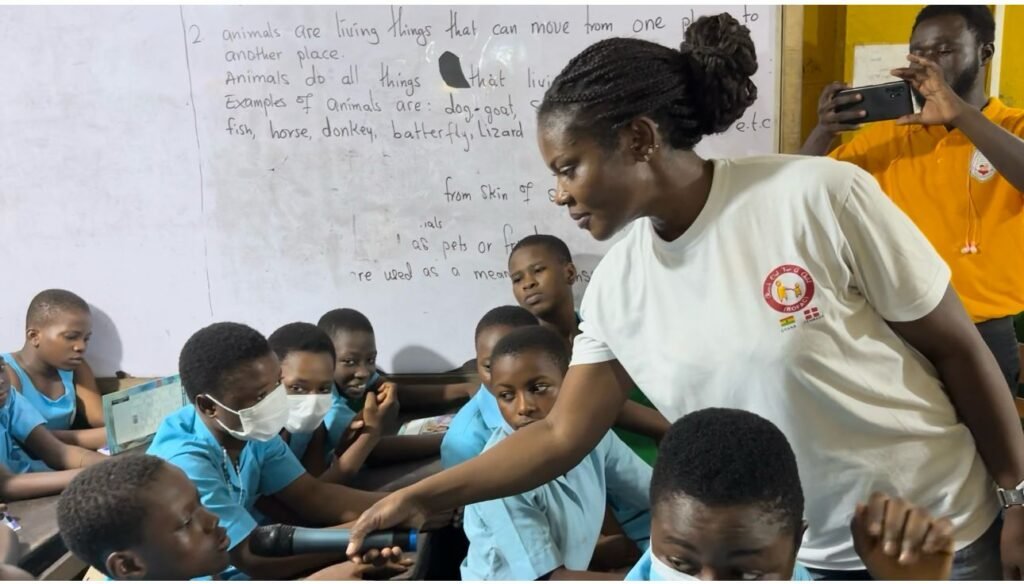
While some have lost their childhood to struggles of life, others have lost it to the cruelty of abuse, neglect and harsh realities of poverty.
Helping bridge the gap by putting smiles on faces of less privileged children, Reach out for a Child (ROFAC) is gradually becoming a household name in the Greater Accra Region, especially within the Ada and the Madina- Adenta enclave.
With the aim to improve education, healthcare, and facilities for the underprivileged group in Ghana, ROFAC believes that by improving school infrastructures, learning will be attractive to children, thus increasing attendance and providing a pleasant and safe learning environment.
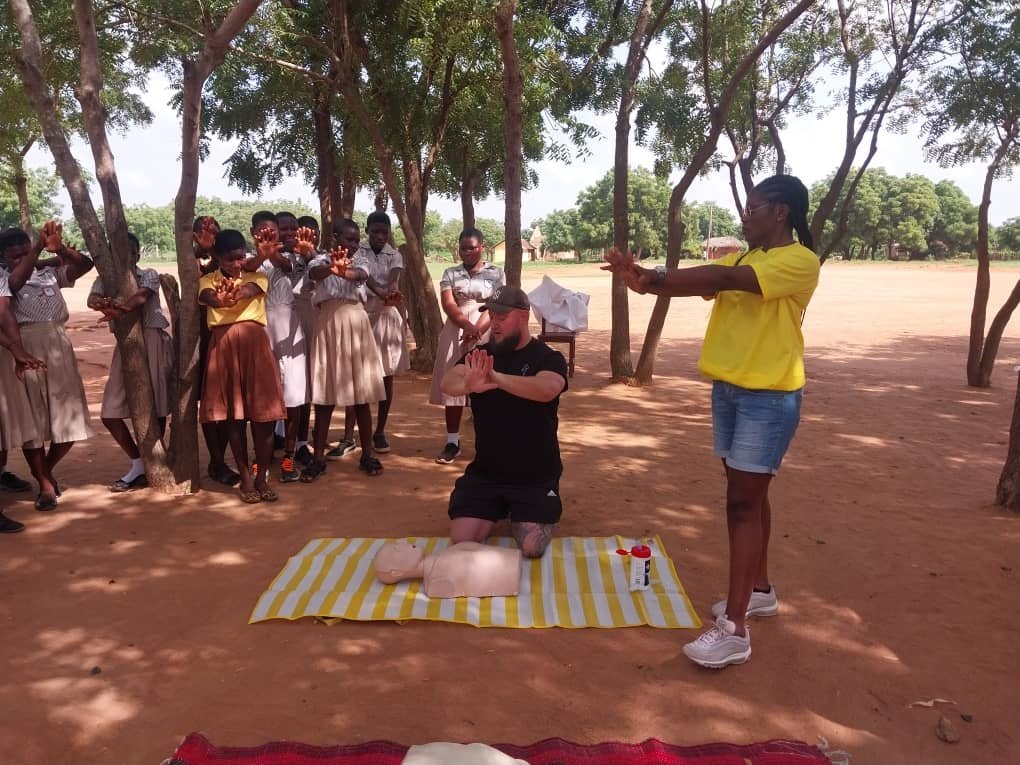
Yvonne Mawufemor Pedersen is an Acute & Emergency Care Nurse (RN, BSN), working in one of the first and largest super-hospitals in Denmark.
How it started
Life in Denmark is far from life in Ghana, where Yvonne grew up.
In 2008 while living in Denmark, Yvonne watched a “United Danish Appeal For Funds” program on television, raise funds to support third world countries, targeting all countries that appear on “The Organization For Economic Cooperation and Development” (OECD), list of third world countries, Ghana was on the list. The television program lit a fire of curiosity in me, but also a level of rage of helplessness.
Growing up in Ghana I knew of some of the challenges some children were subjected to, having to skip school to sell on the streets and in markets to help support the rest of the family. Some, runaways due to domestic violence and abuse. Inadequate infrastructure in most schools didn’t make school attractive either.
I have always had the drive of “Florence Nightingale” I wanted to do something. I wanted to contribute to shifting the narratives of the less privileged. These, and the television program I saw in 2008, contributed to a visit to Ghana, earlier than planned.
The Charity
Reach Out For A Child- (ROFAC) is a small Danish registered charity, started in 2009 by Yvonne Mawufemor Pedersen, a Ghanaian/Togolese resident in Denmark.
The charity was initially formed to raise funds for street children and head potters, after being inspired by a trip while visiting family in Ghana, and sourcing out how to shift the narratives of the above-mentioned group of people. As a result, ROFAC, Ghana was established in the same year, now our partner in Ghana.
Astonishingly, the original target funds were exceeded, and we decided to expand our support to single mothers. We started to raise funds to support the target group, meeting them in the rural areas before their migration to the capital.
As our understanding of rural communities in Ghana grew, so did the scope of our projects, because we understand, there are many factors that contribute to getting a child off the streets and into a classroom, therefore we expanded further to supporting hospitals and schools in rural Accra with teaching aids, hospital equipment’s and giving health education.
As well as lessons in first aid and CPR. This not only includes knowledge to our direct beneficiaries alone, but also that of their families and wider community.
We also, in partnership with our local partners, tailor internship programs for nursing students from Denmark to Ghana.
Our project and since 2009, ROFAC has helped many families in various communities through our numerous projects, and we are determined to ensure that this continues despite challenging circumstances we sometimes encounter.
Through her initiative, ROFAC has over the years, donated school furniture and writing boards for teachers and pupils at the Nuhalenya D/A Primary School in the Ada district, explaining that the organisation has been part of the growing process of the school since the year 2018 for which the head teacher, Mr Narh, together with teachers and some opinion leaders had always expressed their gratitude to the team.

School practicing how to resuscitate
Speaking to The Spectator in Accra last Thursday, Ms Pedersen said the organisation has also begun teaching Cardiopulmonary Resuscitation (CPR) in some basic schools, including Nuhanenya in Ada District and Pauline Queensland schools at Agbogbloshie in the Greater Accra Region to equip young learners with essential skills that can help save lives during cardiac emergencies.
CPR is a lifesaving emergency procedure performed when the heart stops beating.
Introducing the CPR programme in the basic schools, she indicated would not only empower the children with practical knowledge but also promote a culture of safety and responsibility.
In this cause, ROFAC has been advocating the subject matter to teach students the basic steps of CPR, including chest compressions and rescue breaths.
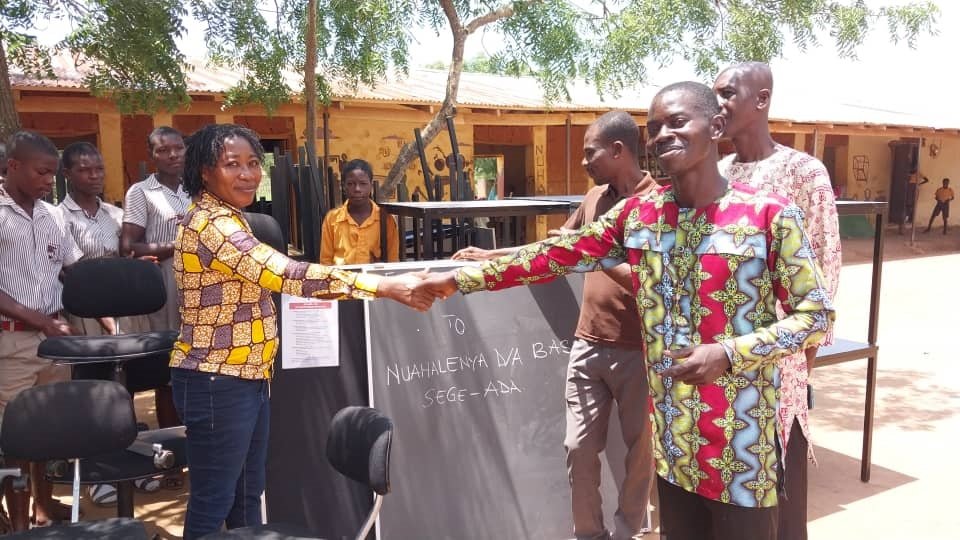
She mentioned that to educate children on recognising emergencies and the importance of seeking adult help will increase awareness of heart health.
As part of the safety measures, ROFAC has also introduce the idea of using child friendly mannequins for the learners to practice chest compressions and breathing techniques under the guidance of medical trainers.
The programme, she said, emphasises on safety, including how to avoid panic and handle emergency situations calmly. The schedule for subsequent teaching children CPR will potentially assist in saving lives within their families and communities.
“Implementing a CPR programme in basic schools is a valuable investment in public health and safety. It empowers students with essential life-saving skills and fosters a sense of responsibility and confidence. By integrating CPR education into the curriculum, schools contribute to building safer communities,” she explained.
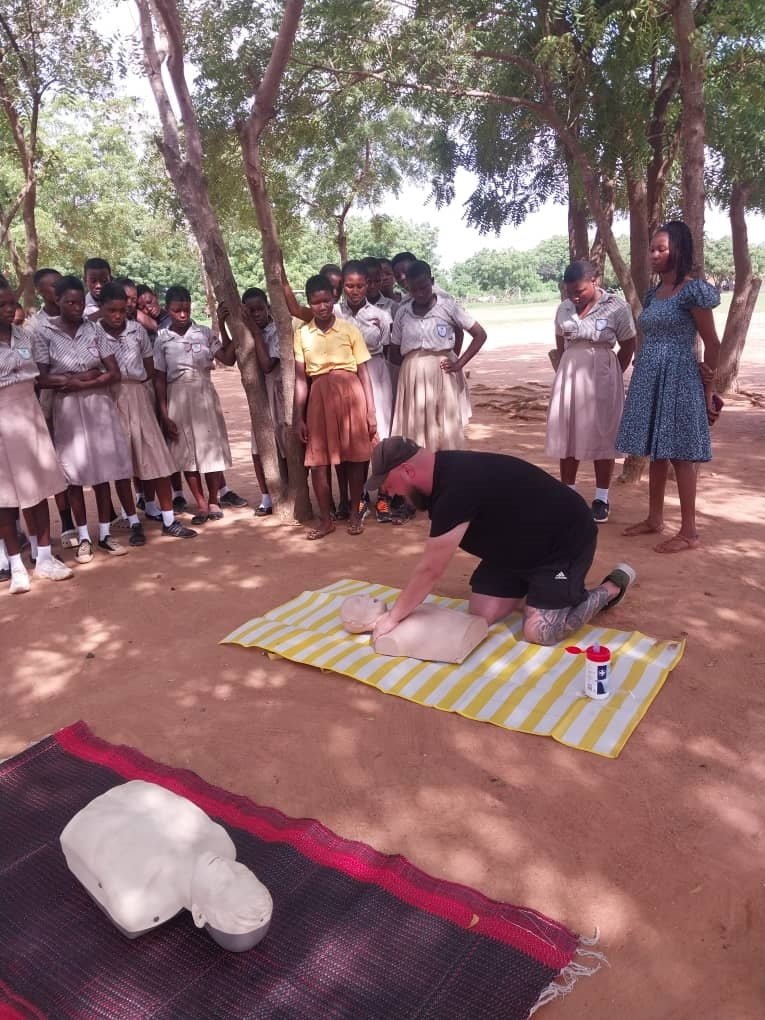
Ms Pedersen further indicated that the programme not only prepares children to respond to emergencies but also cultivates a generation of informed and proactive individuals.
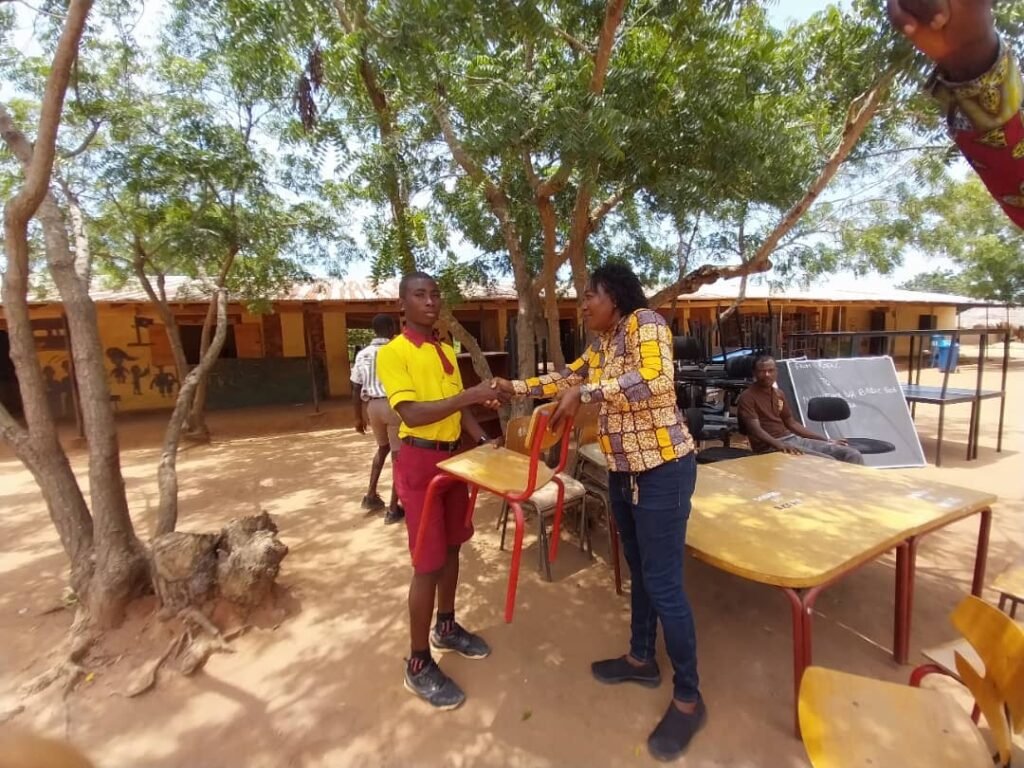
ROFAC also embarked on another project by donating a laboratory incubator to the Duala Medical Clinic based at Burma Camp in Accra.
This follows a request made by the medical doctor in charge, Dr Awura Adjoa Nunoo, for the equipment for services at the facility.
By Lawrence Vomafa-Akpalu
Profile
From passion to plate: Chichi Yakubu’s culinary journey

Driven by her personal weight loss journey and passion for healthy eating, Chichi Yakubu has carved a niche for herself in the culinary industry.
Her dedication and commitment has turned her business, NyoNyo Essentials, to one of Ghana’s most sought-after catering companies in the country.

Born to a Nigerian father and a Ghanaian mother, Chichi grew up in a family of passionate women at Mamprobi Polytechnic.
Her mother, an avid cook, started a small catering business, which Chichi helped manage during vacations.
“From upper primary through to Junior High School, I will close from school to go and help my mother at her small food stand at Sakaman to do the dishes after her customers had eaten.
Her mother was known for her special dough Banku with Okro soup. Her small food joint expanded to become a chop bar where she worked at when on vacations.

She acknowledged that, “this early exposure to entrepreneurship sparked my interest in the culinary industry.”
After her university education, Chichi embarked on a weight loss journey, which led her to explore the culinary side of things.
According to Chichi, her weight loss journey began after she realised in her late teens her family struggle with weight.
“I wasn’t going to just allow it but someway, somehow, I started gaining so much weight in my early twenties and I decided to take action by changing my lifestyle by eating healthy and exercising. That’s what got me interested in meal prepping which eventually became my side hustle,” she narrated.
Chichi later discovered the business potential of healthy food and decided to pursue it. Also her friends were curious about her weight loss strategies, which inspired her to offer meal-prep services at a fee.
With a bold vision and determination, Chichi started small, offering sandwiches, salads, and smoothies.
Leveraging social media marketing, she reached a wider audience and grew her business rapidly.
Today, Chichi is the Chief Executive Officer of Nyonyo Essential, a business that has expanded to cater for weddings, parties, and corporate events with her team providing excellent service, and word-of-mouth referrals have helped her expand her client base.
Again, Chichi has also opened kitchen centres in selected areas, providing healthy food options to Ghanaians.

She mentioned that, her mother has been her number one supporter saying “she had the blue print handed down to me. I started my business in her kitchen, and she also spared me some of her workers when the new people I had hired didn’t show up.
“My then boyfriend and now husband believed in me even when I was not sure to do it full time as I was in corporate Ghana and not doing bad.”
Chichi said one of her biggest challenges was staff retention, adding that she was of the opinion that the work itself was not much of a challenge but the people.

The other thing was stereotyping, saying that, “some years back people look down on food business operators, we were not regarded as professionals with others assuming we are school dropouts or just people who don’t know what we are about.”
But I was determined to change that narrative by handling work with the outmost professionalism, which I have since the beginning of my weight loss journey in 2014.
Chichi is motivated by her faith in Christ, her passion for entrepreneurship, and her commitment to empowering women.
As a wife, mother, and business owner, she strives to create a balance that reflects her vision of an all-rounded woman.
In business, she emphasised, her drive comes from a deep love for the hospitality industry and a desire to help others succeed through the business of catering by NyoNyo, saying that, “My belief that Jesus is Lord guides my decisions, ensuring that integrity, excellence, and purpose shape both my life and business.”
She urged young people, especially young women, who are just starting out in their careers or entrepreneurial journeys to believe in themselves, trust God’s timing, and be willing to put in the work.

Moreover, she said “success does not happen overnight, so stay consistent, be patient, and keep learning. Surround yourself with the right people, mentors, peers, and a support system that challenges and encourages you.”
“Opportunities don’t pause for perfection. While we overthink, others take action. Start where you are, with what you have. The world moves fast—so should we,” – Chichi Yakubu advised
She again added that women should embrace their multifaceted roles without guilt saying “you can be an entrepreneur, a wife, a mother, and a sister’s keeper all at once. Most importantly, stay true to your values and never compromise on integrity. Let your journey reflect both purpose and excellence.”

Chicihi loves to spend quality time away from the noise of life in new places or go on an adventure with her family and friends.
She is a product of Christian home school, Okuapeman secondary, Central University College and Harvard University.
By Jemima Esinam Kuatsinu







